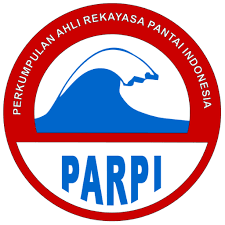ANALYSIS OF PLATE THICKNESS AGAINST CHANGES IN LADDER AND GUARD HEIGHT ON PARANGLOE FLOATING DOCK PLAN
DOI:
https://doi.org/10.62012/sensistek.v7i1.31615Keywords:
Draft, Floating Dock,Freeboard, Loads, Materials.Abstract
Lakkang Island is a small island located in Tallo district, Makassar City, geographically located in the middle of the Makassar Urban Territory, its location is in the delta of the tallo river, so it is isolated from the mainland of Makassar. Access to Lakkang Island must be through water transportation lines by traditional boat (katamaran) as a means of crossing, this is due to the lack of bridge access towards Lakkang. To support the development of tourist areas and the needs of citizens for means of access to transportation. The port becomes the main facility as the suspension of ships that take off passengers, vehicles, goods. The lake islands are in a location on the tallo river and have close proximity to the lightning. The location and the surroundings make this harbour different from the river harbour in general. Analysis of the retreat into one of the parameters of the current, depth. The floating dock could be one of the applications on Lakkang Island. In the design of floating dock the thing to notice is that the size of the gates is small namum has a large capacity. Using load analysis using some material found the influence of the pelate thickness on draft and freeboard at the time of the planned full condition on the floating dock.Downloads
References
Ihsan Dkk., “Penataan Kawasan Wisata Lakkang Berbasis Masyarakat,” J. Tepat Teknol. Terap. Untuk Pengabdi. Masy., Vol. 4, 2021.
E. Watanabe, C. M. Wang, T. Utsonomiya, Dan T. Moan, “Very Large Floating Structures : Applications, Analysis, And Design,” National University Of Singapore, Core Report 2004–02, 2004.
B. Triatmodjo, Perencanaan Pelabuhan. Yogyakarta: Beta Offset, 2009.
A. Kadir Dan S. Hardjono, “Analisis Kekuatan Struktur Dermaga Apung Untuk Pelabuhan Perintis,” War. Penelit. Perhub., Vol. 31, No. 1, Hlm. 47–54, Jul 2019, Doi: 10.25104/Warlit.V31i1.911.
I. S. Igwe Dan T. J. Ajoko, “Analysis And Design Of A Steel Floating Pontoon For Use As Jetty In The Coastal Region Of Nigeria,” Ejers Eur. J. Eng. Res. Sci., Vol. 5, No. 9, Hlm. 1013–1021, Sep 2020, Doi: Http://Dx.Doi.Org/10.24018/Ejers.2020.5.9.1863.
B. Triatmodjo, Hidrologi Terapan. Yogyakarta: Beta Offset, 2006.
D. R. Derret Dan C. B. Barras, Ship Stability For Masters And Mates, 5th Ed. UK: Butterworth-Heinemann, 1999.
A. Fadillah and F. Maulana, “Analysis Of The Application Of Renewable Energy At The Muara Angke Passenger Port As A Means Of Supporting Thousand Island Tourism”, zonalaut, vol. 5, no. 1, pp. 7-14, Mar. 2024.













